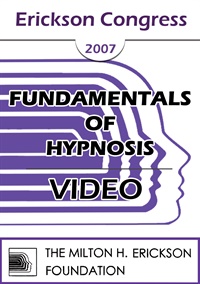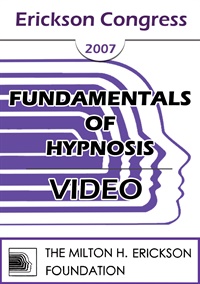Credit available - Click Here for more information
- Average Rating:
- Not yet rated
- Topic Areas:
- Clinical Demonstrations | Hypnosis | Resources | Experiential Therapy | Suggestion | Brief Therapy
- Categories:
- Brief Therapy Conference | Brief Therapy Conference 2018 | Online Continuing Education
- Faculty:
- Michael Yapko, PhD
- Course Levels:
- Master Degree or Higher in Health-Related Field
- Duration:
- 57:31
- Format:
- Audio and Video
- Original Program Date:
- Dec 08, 2018
- Short Description:
- In this demonstration, hypnosis helps a volunteer struggling with stage fright move from self-doubt to grounded confidence. Through imagery, metaphor, and gentle reframing, the process highlights how shifting focus from fear of judgment to the power of one’s message can unlock presence and ease. Participants witness how hypnosis draws on personal resources and past strengths to dissolve performance anxiety and foster resilience.
- Price:
-
Sale is $29.00
price reduced from Base Price - $59.00

- Average Rating:
- Not yet rated
- Topic Areas:
- Special Topics | Hypnosis | Ericksonian Hypnosis and Therapy Techniques | Fundamentals of Hypnosis | Psychotherapy | Truisms | Age Regression | Hypnotic Phenomena | Post-Hypnotic Suggestion | Suggestion | Metaphors
- Categories:
- Brief Therapy Conference | Brief Therapy Conference 2018
- Faculty:
- Brent Geary, PhD
- Duration:
- 5:14:31
- Format:
- Audio Only
- Original Program Date:
- Dec 05, 2018
- Short Description:
- This workshop will provide participants with an introduction to the key concepts and techniques of practice in Ericksonian hypnosis. A brief biography of Erickson’s professional life will provide perspective on the extensive contributions he made to the fields of hypnosis and psychotherapy. Terminology of hypnosis will be explained and various approaches to induction will be described and demonstrated. The process of a typical hypnotic session will be outlined. Considerable attention will be afforded the hypnotic phenomena, the essential mechanisms in hypnotic therapy. Erickson’s landmark concepts of utilization and indirection will be explored with particular focus on the use of therapeutic anecdotes and metaphors.
- Price:
- $15.00 - Base Price
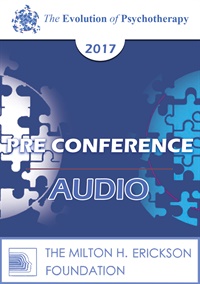
- Average Rating:
- Not yet rated
- Topic Areas:
- Hypnosis | Suggestion | Pre-Conference Sessions | Psychotherapy
- Categories:
- Evolution of Psychotherapy | Evolution of Psychotherapy 2017
- Faculty:
- Michael Yapko, PhD
- Duration:
- 2:40:42
- Format:
- Audio Only
- Original Program Date:
- Dec 12, 2017
- Short Description:
- This session explores how clinical hypnosis can deepen therapeutic impact, particularly for clients struggling with depression, anxiety, or chronic pain. Drawing from decades of empirical research and Ericksonian principles, it examines the structure of hypnotic experience, the role of suggestion, and the power of tailored, experiential interventions. Through case examples and a group exercise, participants gain practical tools for integrating hypnosis into everyday clinical work
- Price:
- $15.00 - Base Price
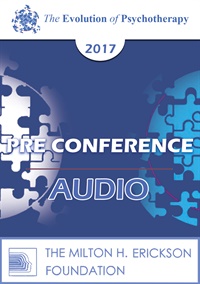
- Average Rating:
- Not yet rated
- Topic Areas:
- Hypnosis | Pre-Conference Sessions | Suggestion | Psychotherapy
- Categories:
- Evolution of Psychotherapy | Evolution of Psychotherapy 2017
- Faculty:
- Michael Yapko, PhD
- Duration:
- 1:11:13
- Format:
- Audio Only
- Original Program Date:
- Dec 12, 2017
- Short Description:
- This session explores how clinical hypnosis can deepen therapeutic impact, particularly for clients struggling with depression, anxiety, or chronic pain. Drawing from decades of empirical research and Ericksonian principles, it examines the structure of hypnotic experience, the role of suggestion, and the power of tailored, experiential interventions. Through case examples and a group exercise, participants gain practical tools for integrating hypnosis into everyday clinical work
- Price:
- $15.00 - Base Price
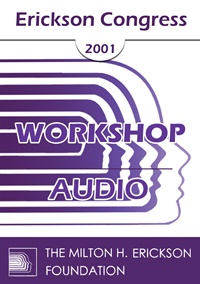
- Average Rating:
- Not yet rated
- Topic Areas:
- Workshops | Metaphors | Confusion Technique | Indirection | Binds | Suggestion
- Categories:
- Erickson Congress 2001 | Erickson Congress
- Faculty:
- Stephen Lankton, MSW
- Duration:
- 2:30:40
- Format:
- Audio Only
- Original Program Date:
- Dec 07, 2001
- Short Description:
- Participants will be guided through several exercises to help them learn and practice the construction of six forms of indirect suggestions, four therapeutic binds and four verbal confusion techniques. A demonstration using these forms will illustrate the implementation of this set of language techniques for the induction process and how they elaborate simple metaphor. Reasons for the use of indirect suggestions, binds and confusion in treatment and their effect will be addressed and demonstrated.
- Price:
- $15.00 - Base Price
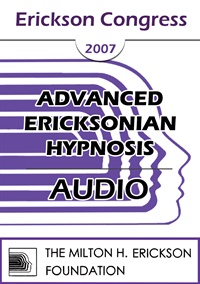
- Average Rating:
- Not yet rated
- Topic Areas:
- Workshops | Confusion Technique | Hypnosis | Indirection | Language of Hypnosis | Binds | Suggestion
- Categories:
- Erickson Congress | Erickson Congress 2007
- Faculty:
- Stephen Lankton, MSW
- Duration:
- 2:50:39
- Format:
- Audio Only
- Original Program Date:
- Dec 10, 2007
- Short Description:
- Participants will be guided through several exercises to help them learn and practice the construction of four forms of confusion technique, bring the number of indirect suggestion to six and the number of therapeutic binds to four. A demonstration using these forms will illustrate the implementations of this set of language techniques for the induction and treatment process.
- Price:
- $15.00 - Base Price
- Average Rating:
- Not yet rated
- Topic Areas:
- Fundamentals of Hypnosis | Hypnosis | Yes Set | Truisms | Suggestion
- Categories:
- Erickson Congress | Erickson Congress 2007
- Faculty:
- Brent Geary, PhD
- Course Levels:
- Master Degree or Higher in Health-Related Field
- Duration:
- 1:42:47
- Format:
- Audio and Video
- Original Program Date:
- Dec 07, 2007
- Short Description:
- It is important to respectfully facilitate a patient's naturalistic elicitation of hypnosis through a rhythmic, absorbing process. This workshop presents "truisms," suggestions, and the "yes set" as just such a way to elicit hypnosis for a variety of applications.
- Price:
-
Sale is $29.00
price reduced from Base Price - $59.00
- Average Rating:
- Not yet rated
- Topic Areas:
- Fundamentals of Hypnosis | Hypnosis | Suggestion | Ericksonian Hypnosis and Therapy Techniques
- Categories:
- Erickson Congress | Erickson Congress 2007
- Faculty:
- Dan Short, PhD
- Course Levels:
- Master Degree or Higher in Health-Related Field
- Duration:
- 1:27:36
- Format:
- Audio and Video
- Original Program Date:
- Dec 07, 2007
- Short Description:
- The conceptualization of “permissive suggestion” ranks among the most important contributions made by Milton Erickson to hypnosis and psychotherapy. Permissive suggestion is a technique that forms a bridge between a full spectrum of hypnot- ic procedures and the type of process needed to address existential dilemmas commonly dealt with in psychotherapy.
- Price:
-
Sale is $29.00
price reduced from Base Price - $59.00
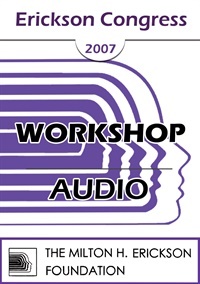
IC07 Workshop 26 - Indirect Suggestions & Therapeutic Binds in Hypnosis - Stephen Lankton, MSW, DAHB
- Average Rating:
- Not yet rated
- Topic Areas:
- Workshops | Ericksonian Hypnosis and Therapy Techniques | Hypnosis | Binds | Indirection | Language of Hypnosis | Suggestion
- Categories:
- Erickson Congress | Erickson Congress 2007
- Faculty:
- Stephen Lankton, MSW
- Duration:
- 1:53:33
- Format:
- Audio Only
- Original Program Date:
- Dec 07, 2007
- Short Description:
- This technique is among the most crucial to good therapy. Participants will be guided through several exercises to help them learn and practice the construction of six forms of indirect suggestions and four forms of binds. A demonstration using these forms will illustrate the implementation of this set of language techniques for the induction and treatment process. The use of indirect suggestions in further treatment will be outlined.
- Price:
- $15.00 - Base Price
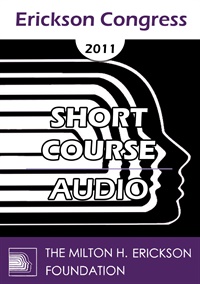
- Average Rating:
- Not yet rated
- Topic Areas:
- Short Courses | Goals of the Therapist | Hypnosis | Post-Hypnotic Suggestion | Suggestion
- Categories:
- Erickson Congress | Erickson Congress 2011
- Faculty:
- Jose Cava Roda, Lic. Psychologist | José Cava, Lic Psychologist
- Duration:
- 1:34:42
- Format:
- Audio Only
- Original Program Date:
- Dec 09, 2011
- Short Description:
- The probability that posthypnotic suggestions will be carried out is highly increased by associating them to the client’s daily life events or activities with an analogical or metaphorical relationship to the therapeutic goals. These life events or activities work as a frequently available signal that facilitates the in-tended behavior or response.
- Price:
- $15.00 - Base Price
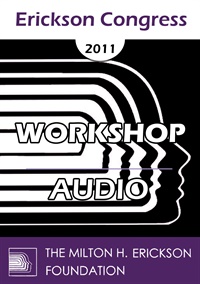
- Average Rating:
- Not yet rated
- Topic Areas:
- Workshops | Ericksonian Hypnosis and Therapy Techniques | Hypnosis | Psychotherapy | Suggestion
- Categories:
- Erickson Congress | Erickson Congress 2011
- Faculty:
- Dan Short, PhD
- Duration:
- 59 Minutes
- Format:
- Audio Only
- Original Program Date:
- Dec 07, 2011
- Short Description:
- The conceptualization of “permissive suggestion” ranks among the most important contributions made by Milton Erickson to hypnosis and psychotherapy. Permissive suggestion is a technique that forms a bridge between a full spectrum of hypnotic procedures and the type of processing needed to address existential dilemmas commonly dealt with in psychotherapy.
- Price:
- $20.00 - Base Price
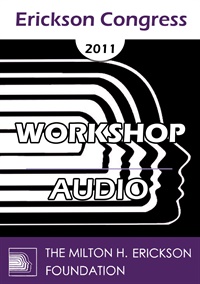
- Average Rating:
- Not yet rated
- Topic Areas:
- Workshops | Hypnosis | Language of Hypnosis | Metaphors | Suggestion
- Categories:
- Erickson Congress | Erickson Congress 2011
- Faculty:
- Norma Barretta, PhD
- Duration:
- 59 Minutes
- Format:
- Audio Only
- Original Program Date:
- Dec 07, 2011
- Short Description:
- This workshop explores how subtle shifts in language can open powerful avenues for change in hypnosis and psychotherapy. Participants learn how ambiguity, wordplay, humor, and metaphor invite unconscious processing, deepen trance, and reshape meaning without direct instruction. Through stories, demonstrations, and lively examples, the session shows how carefully chosen words influence perception, emotion, and behavior, and how therapists can sharpen their linguistic awareness to work more creatively, flexibly, and effectively in everyday clinical conversations.
- Price:
- $20.00 - Base Price
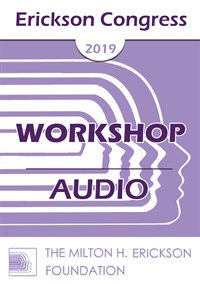
- Average Rating:
- Not yet rated
- Topic Areas:
- Workshops | Obsessive Compulsive Disorder (OCD) | Hypnosis | Post-Hypnotic Suggestion | Suggestion
- Categories:
- Erickson Congress | Erickson Congress 2019
- Faculty:
- Krzysztof Klajs, Dipl. Psych
- Duration:
- 1 Hour 57 Minutes
- Format:
- Audio Only
- Original Program Date:
- Dec 15, 2019
- Short Description:
- OCD is a rather chronic illness affecting about 2.5% of adults. Its diagnosis is perceived as a demanding and challenging one. Trance phenomena can be described as natural behavioral manifestations of the trance state. They can be observed in individuals as well as in family communication patterns. In OCD families, one of the most powerful and widely present trance phenomena are the posthypnotic suggestions. They are invisible, deeply hidden, mighty and long lasting.
- Price:
- $15.00 - Base Price



